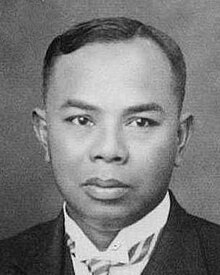Marco Kartodikromo
| Marco Kartodikromo | |
|---|---|

Kartodikromo in the early 1920s
|
|
| Born | 1890 Blora, Central Java, Dutch East Indies |
| Died | March 18, 1932 (aged 41–42) Boven-Digoel, Papua, Dutch East Indies |
| Cause of death | Malaria |
| Other names | Mas Marco (pen name) |
| Occupation | Journalist, writer |
| Years active | 1911–1926 |
Marco Kartodikromo (1890 – 18 March 1932), also known by his pen name Mas Marco, was an Indonesian journalist and writer.
Born to a low-ranking priyayi (noble) family in Blora, Dutch East Indies, Kartodikromo's first employment was with the national railway. Disgusted by the racism shown there, in 1911 he moved to Bandung and found work as a journalist for Medan Prijaji. The following year he moved to Surakarta and worked with two publications, Saro Tomo and Doenia Bergerak; he soon began to write pieces critical against the Dutch colonial government, which led to his arrest. After a period as a correspondent in the Netherlands, Kartodikromo continued his journalism and critique of the government; he also wrote several pieces of fiction. Involved with the Communist Party of Indonesia, after a 1926 communist-led revolt Kartodikromo was exiled to Boven-Digoel prison camp in Papua. He died in the camp of malaria in 1932.
Kartodikromo, who preferred writing in Malay, experimented with new phrasings at a time when the state-owned publisher Balai Pustaka was attempting to standardise the language. According to literary critic Bakri Siregar, he was the first Indonesian writer to openly criticise the Dutch colonial government and the traditional form of feudalism practised in the country. For this vocal criticism, the Dutch government decried him as a "crazy" man who could spark unrest among the native populations.
Kartodikromo was born in Blora, Central Java, Dutch East Indies, in 1890 to a low-ranking priyayi (noble) family. At the age of fifteen, he took up a job at the Nederlandsch-Indische Spoorweg, the national railway company of the Indies, in Semarang. In 1911 he chose to leave the company as he was disgusted by its racist policies, including the use of race as a basis for the amount paid in wages.
...
Wikipedia
